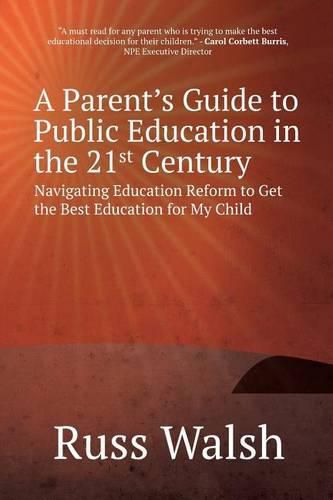Readings Newsletter
Become a Readings Member to make your shopping experience even easier.
Sign in or sign up for free!
You’re not far away from qualifying for FREE standard shipping within Australia
You’ve qualified for FREE standard shipping within Australia
The cart is loading…






This title is printed to order. This book may have been self-published. If so, we cannot guarantee the quality of the content. In the main most books will have gone through the editing process however some may not. We therefore suggest that you be aware of this before ordering this book. If in doubt check either the author or publisher’s details as we are unable to accept any returns unless they are faulty. Please contact us if you have any questions.
What is a parent to make of the current narrative about public education in the United States? We hear that our public schools are mediocre at best and dysfunctional and unsafe at worst. We hear politicians and pundits arguing that the country will fall behind economic competitors like China and Japan, if our schools do not improve. We hear education reformers, well-funded by corporate lions like Bill Gates and the Walton family, suggesting a smorgasbord of solutions from school choice to more rigorous standards and from increased standardized tests to test-based teacher accountability.
What is education reform and how will it impact schools, children and parents? What are charter schools and should I send my child to one? What is the impact of standardized testing on my child? Should I opt my child out of standardized testing? How can I make sure my child gets a good teacher? What does good reading and writing instruction look like? How should technology be used in the schools and at home?
A Parent’s Guide to Public Education in the 21st Century is written to answer these questions and help today’s parents sort through the weeds of educational reform to make informed decisions designed to get the best possible education for their children. The book starts from the point of view that public education is a vital institution, central to our democracy and economic independence, and then suggests ways that parents can not only get the best of education for their own children, but also support policies that will make the institution of public education stronger for future generations.
$9.00 standard shipping within Australia
FREE standard shipping within Australia for orders over $100.00
Express & International shipping calculated at checkout
This title is printed to order. This book may have been self-published. If so, we cannot guarantee the quality of the content. In the main most books will have gone through the editing process however some may not. We therefore suggest that you be aware of this before ordering this book. If in doubt check either the author or publisher’s details as we are unable to accept any returns unless they are faulty. Please contact us if you have any questions.
What is a parent to make of the current narrative about public education in the United States? We hear that our public schools are mediocre at best and dysfunctional and unsafe at worst. We hear politicians and pundits arguing that the country will fall behind economic competitors like China and Japan, if our schools do not improve. We hear education reformers, well-funded by corporate lions like Bill Gates and the Walton family, suggesting a smorgasbord of solutions from school choice to more rigorous standards and from increased standardized tests to test-based teacher accountability.
What is education reform and how will it impact schools, children and parents? What are charter schools and should I send my child to one? What is the impact of standardized testing on my child? Should I opt my child out of standardized testing? How can I make sure my child gets a good teacher? What does good reading and writing instruction look like? How should technology be used in the schools and at home?
A Parent’s Guide to Public Education in the 21st Century is written to answer these questions and help today’s parents sort through the weeds of educational reform to make informed decisions designed to get the best possible education for their children. The book starts from the point of view that public education is a vital institution, central to our democracy and economic independence, and then suggests ways that parents can not only get the best of education for their own children, but also support policies that will make the institution of public education stronger for future generations.